Book contents
- Frontmatter
- Contents
- A new perspective on the state
- The modern territorial state: limits to internationalization of the state's resources
- The rule of law: internationalization and privatization
- 4 Is there an emerging international rule of law?
- 5 Free trade: the erosion of national, and the birth of transnational governance
- The democratic nation state: erosion, or transformation, of legitimacy
- The intervention state: the shifting welfare component
- Index
4 - Is there an emerging international rule of law?
Published online by Cambridge University Press: 04 August 2010
- Frontmatter
- Contents
- A new perspective on the state
- The modern territorial state: limits to internationalization of the state's resources
- The rule of law: internationalization and privatization
- 4 Is there an emerging international rule of law?
- 5 Free trade: the erosion of national, and the birth of transnational governance
- The democratic nation state: erosion, or transformation, of legitimacy
- The intervention state: the shifting welfare component
- Index
Summary
An international rule of law complementing modern states' domestic rule of law seems to be emerging. At least in the four issue areas of international law considered here – international trade, security, labour, and environmental law – empirical evidence suggests that relevant dispute settlement procedures have been judicialized and their use by complainants as well as their acceptance by defendants have increased in practice. Albeit still far from what we are used to from the domestic rule of law, the emergence of an international rule of law can be regarded as indicative of a fundamental transformation of modern states.
Introduction
Since the 17th century, the rule of law has emerged as the dominant legal principle within modern states, while between modern states sovereignty has become the central legal principle. The former principle reflects the domestic hierarchy of the state over its society, while the latter institutionalizes the anarchy within the international society of states. Legally, both principles are fundamental to modern states' identity. As principles, however, rule of law and sovereignty could hardly be more contradictory. While the rule of law requires that states respect domestic law, sovereignty gives states the justification to act arbitrarily at their discretion beyond international law. If, therefore, a substantial international rule of law were to emerge that complements the domestic rule of law, this would amount to a fundamental transformation of the modern state.
- Type
- Chapter
- Information
- Transformations of the State? , pp. 73 - 92Publisher: Cambridge University PressPrint publication year: 2005
- 5
- Cited by



